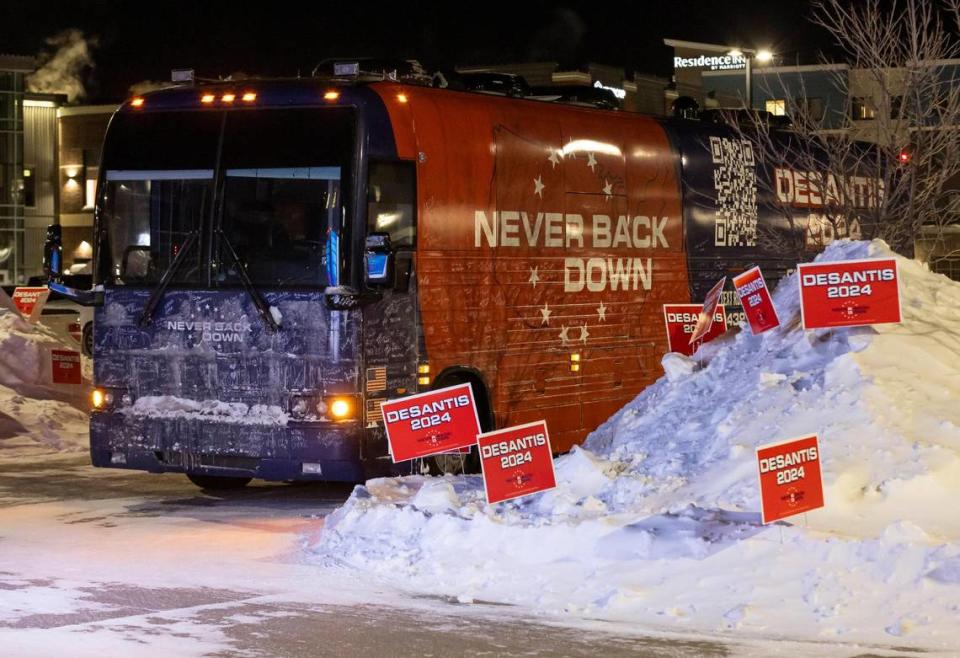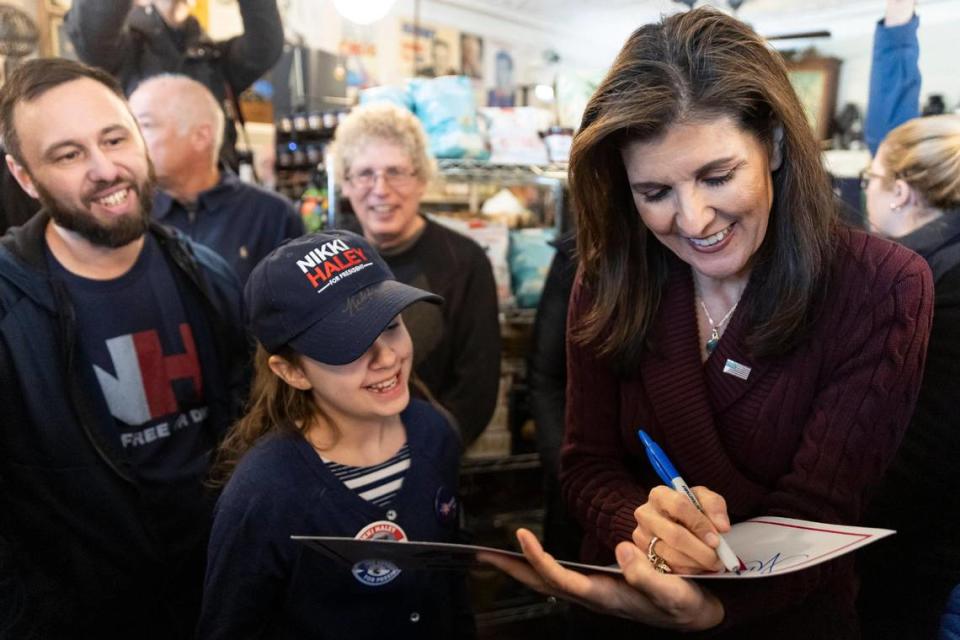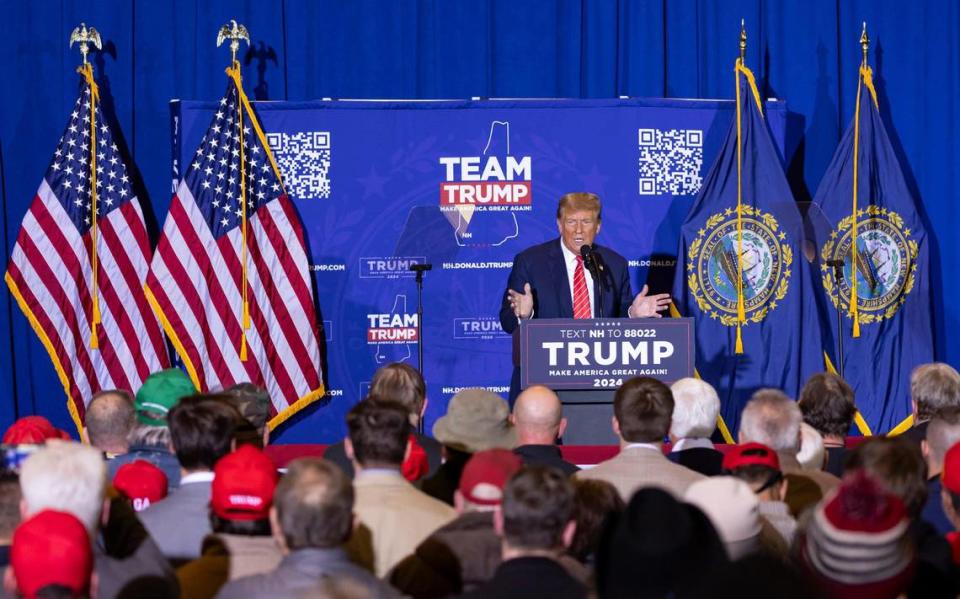5 reasons DeSantis’ presidential campaign collapsed before the GOP’s first primary
Once viewed as the strongest contender to former President Donald Trump, Florida Gov. Ron DeSantis aborted his stumbling presidential campaign on Sunday, acknowledging that he had no path to the Republican nomination.
His announcement, by video, ended a campaign that was marred from the jump, beginning with a glitch-plagued announcement on the platform formerly known as Twitter and lasting another eight months, despite in-fighting and missteps.
Here are five of the biggest reasons his campaign collapsed:
His Iowa strategy didn’t pay off
DeSantis’ campaign and an allied super PAC, Never Back Down, went all-in on Iowa, betting that a strong showing in the first nominating contest would undercut Trump and project him forward. They assembed a massive door-knocking and voter outreach operation that was unrivaled in modern politics.
DeSantis himself campaigned in each of the state’s 99 counties — and went on to lose every one of them.
READ MORE: Republicans see narrow path for DeSantis through early primary states: ‘Iowa is crucial’
He tailored his message to the political appetites of an Iowa electorate, deploying anti-abortion rights rhetoric and a populist tone that cast him as a political outsider who could use the force of government to accomplish conservative policy priorities. His focus appeared to hobble his campaign in other important early-voting states, like libertarian-leaning New Hampshire.
Polling in the Granite State showed DeSantis performing notably worse than in Iowa prior to ending his campaign on Sunday.
Persistent fractures in his political operation
From the outset, DeSantis’ campaign showed signs of internal struggles. Many of his top staffers had never worked on a presidential operation before, including his first campaign manager Genera Peck, who was removed from the post after less than two months on the job.
RELATED: Don’t know DeSantis’ campaign manager? Generra Peck would like to keep it that way

But instead of replacing her with an experienced campaign veteran, he instead elevated his chief of staff from the Florida governor’s office, James Uthmeier, who also lacked presidential campaign experience.
To fill gaps in his formal campaign operation, DeSantis leaned heavily on Never Back Down to handle key functions typically reserved for a candidate’s campaign. The super PAC was staffed by longtime political operatives like Republican strategists Jeff Roe and David Polyansky, a veteran of Iowa campaigns. Polyansky was eventually brought onto DeSantis’ team as deputy campaign manager.
The reliance on Never Back Down led to its own set of problems. Many of the group’s experienced operatives found themselves at loggerheads with members of DeSantis’ inner circle — and sometimes even the governor himself — over messaging strategies. Late last year, a group of DeSantis loyalists formed a new super PAC called Fight Right to handle TV ad spending.
Never Back Down also struggled with internal strife. Several of the group’s leaders and high-profile staffers either resigned or were fired in the weeks before the Iowa caucuses, including CEO Chris Jankowski and Roe.
Voters didn’t want to ‘Make America Florida’
DeSantis put his governing record in Florida front and center on the campaign trail, preaching what he called the “Florida blueprint” to voters nationwide.
He boasted about his decision to reopen Florida’s economy early on during the COVID-19 pandemic, bragged about reducing the state debt and rallied supporters over his ongoing fight with Walt Disney World over the company’s special tax district in Central Florida.
Steve Long, 60, of Ogden, Iowa said that he liked what he had heard about DeSantis’ record on education in Florida, but raised an issue that has been a persistent political headache in the Sunshine State.
“I heard that insurance is getting pretty expensive down there,” said Long, who was supporting entrepreneur Vivek Ramaswamy’s presidential campaign.
Jackie Sapp, 68, a retired school teacher from Kelly, Iowa said that she had considered supporting DeSantis, but ultimately decided to back former United Nations Ambassador Nikki Haley. Sapp said that DeSantis wasn’t “real concrete on his main policies.”
“It seems like he attacks. But what are your ideas? How are you going to approach it? It’s always about ‘me, me, me.’ And I don’t want someone who’s ‘me, me, me.’ ”

The Trump factor
From the outset, the biggest challenge facing DeSantis’ campaign — and those of virtually every 2024 Republican candidate — was how to loosen Trump’s vise-like grip over the GOP voter base.

Despite losing reelection in 2020 and facing numerous legal problems, Trump has consistently polled double-digits ahead of his nearest Republican rivals, prompting him to treat the primary, in some ways, as more of a coronation than a contest. Ultimately, convincing Republicans that it was time to move on from Trump proved too tall an order for DeSantis.
Throughout much of his campaign, he treaded lightly when it came to contrasting himself with the former president, who was once a key political ally of the governor. DeSantis’ argument hinged on the notion that he could accomplish the promises that went unfulfilled during Trump’s tenure in the White House.
In the final weeks of his campaign, DeSantis began to sharpen his criticism of Trump. He notably insisted that the former president is not “pro-life” during a nationally televised CNN town hall. On the trail, he repeatedly deployed the line that Trump was campaigning for president on “his issues,” while DeSantis was focused on voters’ issues.
David Kochel, a veteran Republican strategist in Iowa, said that part of the challenge for DeSantis and the other candidates was that Trump’s supporters have stood firm with the former president and aren’t likely to abandon him. That means that the GOP nominating contest has simply been a race to determine who will run one-on-one against Trump, he said.
“The Trump vote is already there,” Kochel said. “The job of Iowa and New Hampshire is to answer the question of which candidate earns the right to take on Trump. And if that doesn’t get resolved, then Trump runs away as the nominee.”
DeSantis’ media strategy failed
DeSantis and his campaign bet that he could ascend nationally the same way he did in the state: by attacking reporters and stiff-arming most of the press, preferring interviews with friendly, conservative outlets. Last week, he admitted that he should have done more “corporate shows.”


